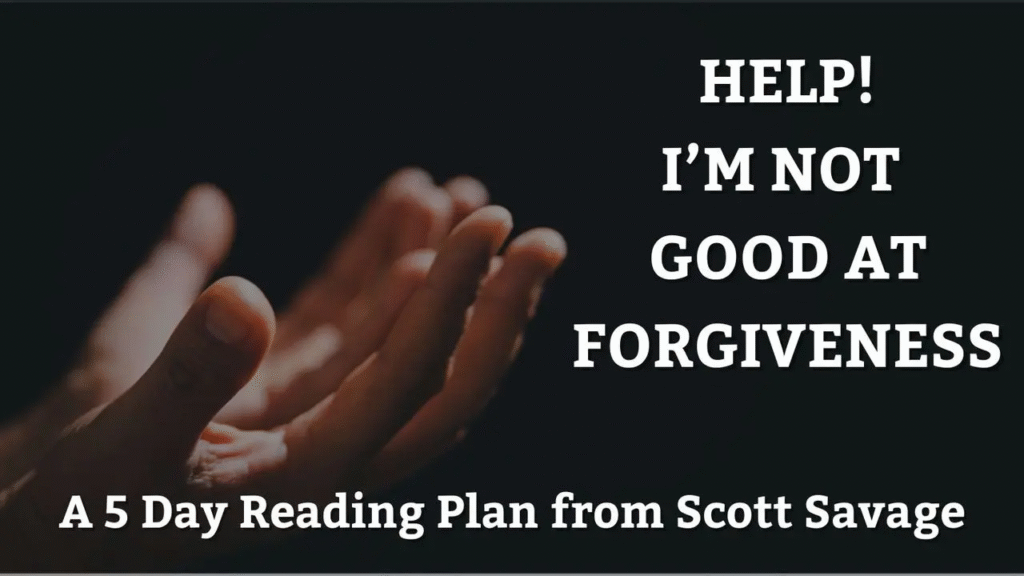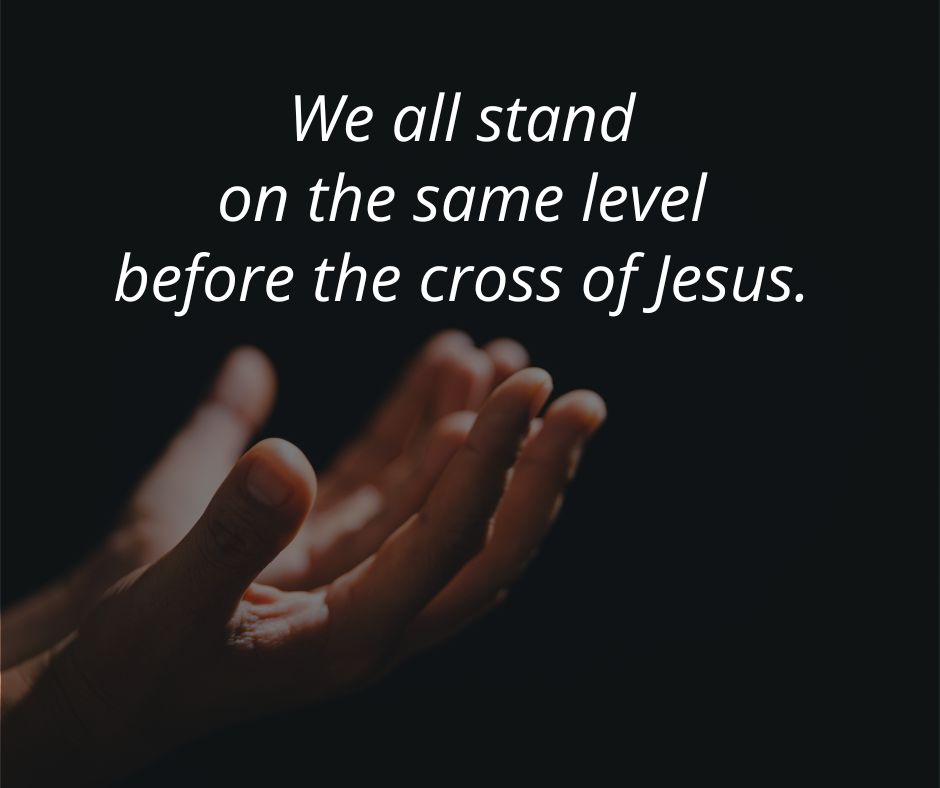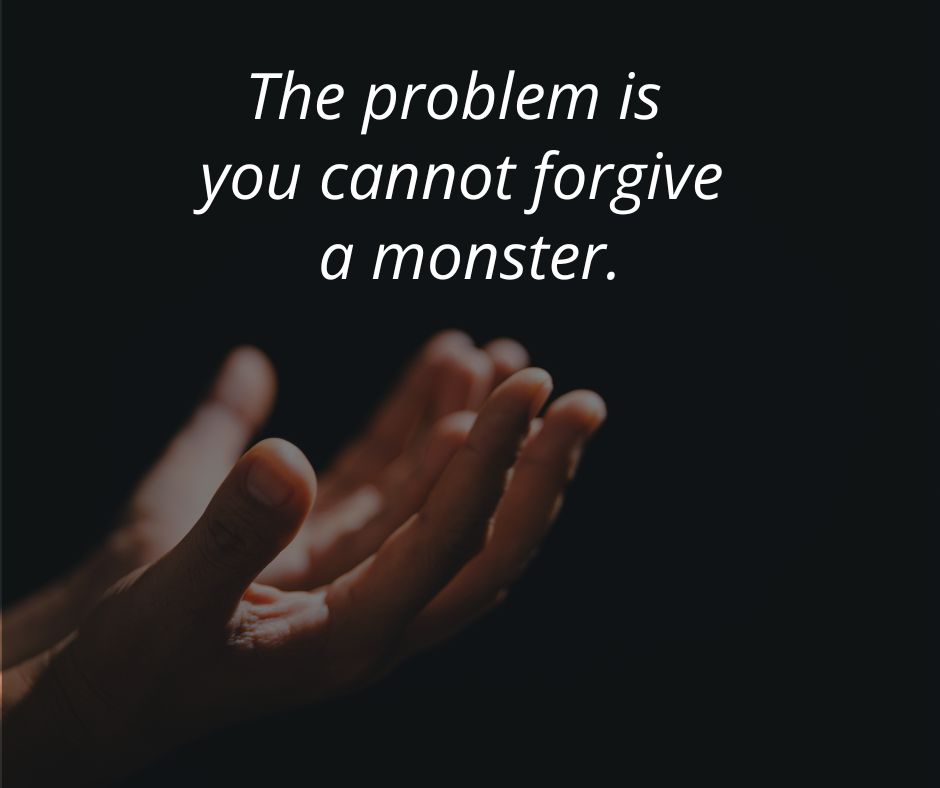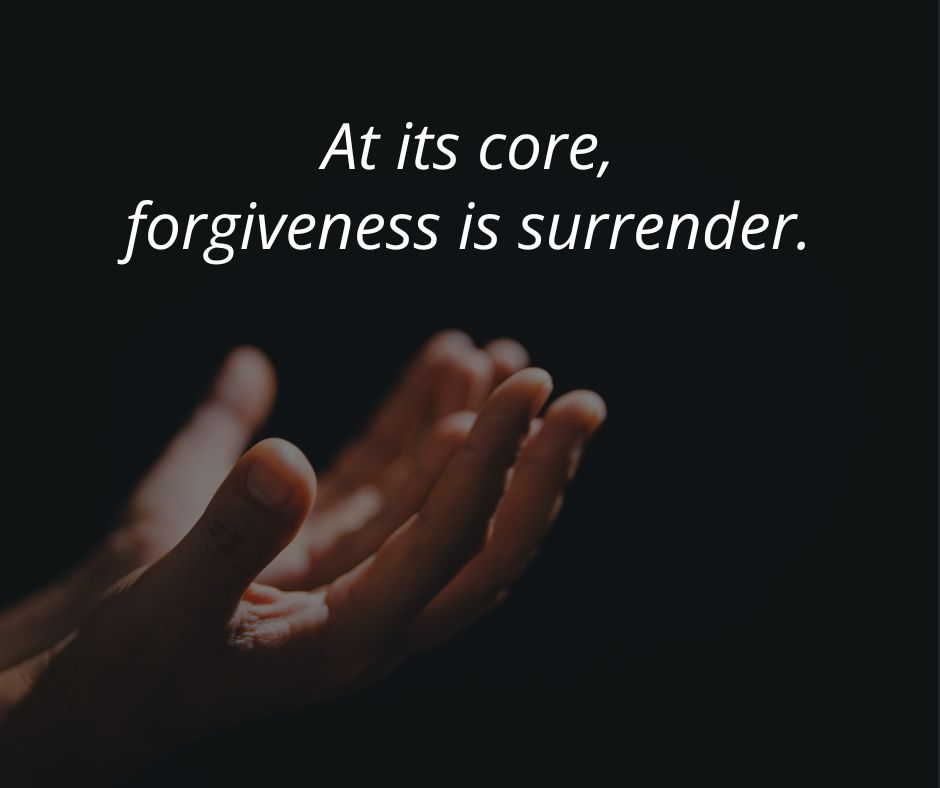
Forgiveness is not easy, and many of us struggle with it. How do we get better at forgiving? This plan unpacks Jesus’ most famous teaching on forgiveness and four key attitudes He builds in us as we accept His forgiveness ourselves. If you’re not good at forgiveness, this is the plan for you!Scott Savage
Day 1
Scriptures: Ephesians 4:32, Galatians 5:1, Isaiah 53:4-5

The Amish called it “The Happening.”
In October 2006, on a typical morning in a one-room schoolhouse in Lancaster County, Pennsylvania, a community was torn apart when a man walked in and opened fire. That day, five young girls lost their lives.
America’s attention was drawn to that corner of Pennsylvania, and millions watched in awe and wonder as the Amish responded. They did not react with revenge; instead, they chose to forgive the killer.
A movie entitled Amish Grace told the story of these families and this moment. One of the film’s scenes haunted me as two parents argued about their different responses to the loss of their daughter. The father chose to forgive and went to visit the family of the killer. The wife refused to forgive, angry at her husband’s actions. In the scene, she said,
“God has shattered my heart. And I will not betray my daughter by forgiving the man who killed her. I will not do it, Gideon. I cannot.”
In my experience, when the topic of forgiveness comes up, the names, faces, and experiences resemble the messy aftermath of that tragedy in Lancaster County. In the face of such pain, simple, easy, or neat answers about forgiveness prove unhelpful.
This plan is designed for people who are not good at forgiving when they’ve been hurt or wounded. It is not focused on the person who hurt or wounded you. We don’t control what they do—that’s between them and God.
But we do get to choose our response to what happened to us. Jesus died on the cross and paid a terrible price that we might be free. If we remain stuck in bitterness and unforgiveness, we will never taste that freedom for which He gave His life. We will remain stuck in a toxic place of poison and pain.
We can all improve our forgiveness. We cannot forgive in our own power and strength. However, when we experience Jesus’ forgiveness, we gain the strength we need. Our ability to forgive is directly related to the forgiveness we’ve received.
Over the rest of this plan, we will explore this big idea—forgiven people can forgive. I’m not saying forgiven people forgive easily, nor that they can forgive simply and quickly. Instead, I will show you how it is possible that God forgives us and enables us to forgive others.
On the next day of this plan, we’ll examine a passage that shows what it looks like when someone embraces the idea that forgiven people can forgive and the four attitudes that help us forgive in the power God gives.
Day 2
Scriptures: Matthew 18:21-30, Ephesians 4:31-32

Matthew 18:21-35 is known as “The Parable of the Unmerciful Servant.” The story of this servant invites us to learn from his mistakes about who God is creating us and calling us to be. The short version of the story is this: a man owes a massive debt. The debt is so large that he would never be able to repay it. To the shock of everyone, the king who was owed the debt chose to forgive it.
The forgiven man then proceeds to find another man who owes him a small sum, especially by comparison to the debt that’s just been forgiven. Though his debt was forgiven, the first man’s heart was unchanged.
In this plan, I want to share four key attitudes that help us forgive others. Each attitude is the product of receiving God’s forgiveness through Jesus Christ. The first attitude that being forgiven creates in us is humility. When we are forgiven, we have an opportunity to be humbled.
In this story, which Jesus tells in Matthew 18, the unmerciful servant struggles to forgive, refusing to give what he had been given to the man who owed him. The first man’s pride kept him from giving forgiveness. He saw himself as better than the man who owed him the small debt. For many of us who struggle to forgive, one of the barriers for us is our arrogance. We struggle to believe we are the same when we think about the person who hurt us. Many of us feel that we’re better or above them.
We’ll never fully experience the forgiveness God desires for us as long as we believe we’re better than those who hurt us. The Bible says we are no better than those who hurt us.
This reality was a jagged pill for me to swallow several years ago. While preparing to preach a series on forgiveness, I discovered I had yet another person I needed to forgive. Truthfully, I thought I was better than them.
Now, I’m not excited to share this truth with the world. However, as I considered what happened in the incident that injured me, I responded arrogantly: “If I were in their shoes, I wouldn’t have done that.”
Why did I say that?! Because I thought I was a better person than they were. As long as I looked down on them with pride and arrogance, I would never forgive them.
When we experience the forgiveness that comes from Jesus, facing our sin and brokenness with sobriety, we realize that without His forgiveness, we are hopeless!
We all stand on the same level before the cross of Jesus. We all need to be forgiven because given the right circumstances, all of us wound others. When we truly embrace Jesus’ mercy and forgiveness, God humbles us.
However, the unmerciful servant wasn’t humbled. He didn’t get it. Forgiveness didn’t sink into his heart. What happened to him failed to change him. In Ephesians 4, Paul wrote about getting rid of bitterness and anger and replacing them with kindness, tenderness, and forgiveness. He didn’t tell us to do this because we’re good people. He told us to do this “because God in Christ forgave you.”
On day three of this plan, we’ll examine the second attitude forgiveness creates. Let me warn you—it is an attitude I did not see coming!
Day 3
Scriptures: Matthew 18:26, Matthew 18:29, Matthew 18:32-34, Romans 5:8

To understand the story Jesus told in Matthew 18, we need to think about money for a moment.
Because we do not use ancient Roman currency, we often miss a significant element of Matthew 18:21-35. When we put the amount owed by the unmerciful servant in modern terms, he owed the equivalent of billions of dollars.
It’s a number so huge that most of us can’t even comprehend what that would look like. This sum is so large it boggles our minds. How could he have racked up a debt that large?!
Regardless of how the debt was created, the man could’ve pleaded to work off the rest of his life or sell all he owned. Yet, no action on his part would’ve remedied his debt.
The first shocking part of the story is that this inconceivably large debt was forgiven. The second surprising part happens when the forgiven servant immediately finds a man who owes him what, in modern terms, is several thousand dollars and begins to choke him. The man who was forgiven a debt of billions refused to forgive a debt of thousands.
One word to describe what was missing in this man’s heart is empathy. Empathy is the ability to understand and share another person’s feelings. If anyone could understand another person’s feelings, it was this first servant. He shared the experience of suddenly being summoned to pay a debt.
One of the things I discovered as I meditated on the text is the use of similar words. When the unmerciful servant speaks to the king, the text says he falls on his knees and says, “Have patience with me, and I will pay you everything.” The same man who spoke those words goes out and chokes another man. As he is being choked, the second man says, “Have patience with me, and I will pay you.”
They say the same words and ask for the same mercy. This first man gets it but won’t give it to another. The “unmerciful servant” refuses to empathize with another’s experience. He cannot forgive because he is unwilling to stand in that man’s shoes.
When we experience the forgiveness of God in a way that transforms us, it humbles us. We realize we’re standing on the same ground and begin empathizing with their experience.
When people hurt us deeply, one of our temptations is to turn them into monsters to diminish their humanity. We assume the worst motives and wonder how someone could do what they did. The problem is that you cannot forgive a monster.
However, what happens when we realize the incredible debt God has forgiven us?
Have you ever returned to your memories of your worst moments and greatest sins? At times, mine feel like a huge debt. When I reflect on my sins and then put myself in the shoes of another, I remember that they’re human, just like me. They’re broken like me. They’re capable of the same kind of destructive decisions that I am.
I’ve hurt others, and others have hurt me. I’m not blessing, minimizing, or excusing the destructive actions of others. But remember—we cannot forgive people we make into monsters. When you can empathize with someone and stand in their shoes, you acknowledge their humanity. You can only forgive humans; you can’t forgive monsters.
God uses empathy to enable us to forgive. In the parable, the unmerciful servant missed the opportunity to empathize. I’m praying for you to take that opportunity today.
On the following day of this plan, we’ll study the essential connection that Jesus makes, which will help you forgive.
Day 4
Scriptures: Matthew 5:7, Matthew 6:12, Matthew 18:35, Ephesians 2:4-5

In my college years, you could have picked a lot of adjectives to describe me. Some of them are positive—passionate, confident, and friendly. But others are negative—arrogant, harsh, and judgmental. I don’t know anyone who would’ve used the word “merciful.”
One of my biggest challenges was not relating to God based on the forgiveness I had been given but rather the good things I was doing. It wasn’t until I realized the depth of God’s forgiveness and unconditional love for me that my “mercy muscle” grew.
In addition to humility and empathy, the third attitude forgiveness builds in us is mercy. When we recognize the depth of our forgiveness, our hearts transform, and a merciful attitude develops.
In the parable, both men owed debts. Those owed the debt had every right to call for debt payment. However, the man who received mercy for the forgiveness of his debt refused to give that same mercy to the man who owed him a debt.
Jesus opened his most famous sermon with a list of blessings. Near the beginning of the Sermon on the Mount, Jesus stated, “Blessed are the merciful, for they shall receive mercy.“ Later in that sermon, during a section known as the Lord’s Prayer, He taught His disciples to pray to be forgiven even as they forgave those who were indebted to them. Finally, after telling the Parable of the Unmerciful Servant, Jesus warned his audience about the outcome of the unmerciful servant’s refusal to forgive. “This is how my heavenly Father will treat you unless you forgive your brother or sister from your heart.”
Jesus constantly connects the forgiveness we receive with the forgiveness we give and the mercy we receive with the mercy we give. Yet many of us struggle to accept that the person who hurt us receives mercy.We feel like the woman in that scene from the movie Amish Grace, which I referenced on the first day of this plan.
Is forgiving someone who wrongs those we love betraying our friendship? Many people refuse to forgive because they think their refusal shows that they value accountability.
However, refusing to forgive means something much worse. Refusing to forgive shows that we struggle to trust God to do His job and trust ourselves more than Him.
Pastor Craig Groeschel once said, “What you fear reveals where you trust God least.” When I’ve examined my refusal to forgive, I’ve often found fear. I’m afraid that accountability will not happen, and I’m even scared that God will not show them mercy. I want mercy from God for myself, but I don’t want it for them.
Several years ago, “Oceans” by Hillsong was one of the most popular songs for churches to sing on Sundays in America. There’s a line in the bridge section which includes a bold prayer.“Spirit, lead me where my trust is without borders.”
We all have borders where we discover how much we trust God. For example, giving another person mercy and forgiveness might be a borderline for you.
Whether you’ve sung that song recently, perhaps God has answered that prayer by bringing you to this plan. You thought the question this plan would answer is, “How do I forgive them? But, now God may ask you, “Will you trust me with this?”
On the final day of this plan, we will explore that question further and consider what trust looks like in action.
Day 5
Scriptures: Romans 12:1, Matthew 5:43-45, Luke 6:37

In American culture, we have a phrase—“a four-letter word”—because several profane words are four letters in length.
The fourth attitude that forgiveness builds in us is a tricky word. It may not be four letters in length, but it’s a word that many avoid. That word is surrender.
When we experience God’s forgiveness, we are led to surrender our lives to Him. In Romans 12, the Apostle Paul urges his readers to offer their bodies as living sacrifices to God in light of God’s great mercy toward them.
Many of us view surrender as a weakness or giving up. If I surrender in a battle, I’m saying you’re stronger than me, or I don’t have any fight left. But surrender isn’t always a bad thing. After all, my favorite definition of forgiveness is “giving up my pursuit of revenge and trusting God to bring justice.” At its core, forgiveness is surrender. We let go of our desire to get even or to hurt the person the way they hurt us.
After watching the Amish Grace clip I described on day one, I watched a news report broadcast on the 10th anniversary. Journalists returned to Lancaster County people and explored untold stories from “The Happening.”
In the days after the shooting, financial donations flooded into Lancaster County from all over the country. Many people wanted to help the five families of the girls who had been killed, along with five other families whose daughters had been wounded.
Surprisingly, those Amish families took a large portion of the donated money and funneled it to the widow and children of the shooter. I didn’t see that detail coming!
The journalist interviewed a local college professor who studied the Amish his whole career. The professor recounted a conversation with an Amish man named Abner. The professor asked Abner, “How do you define forgiveness?” Abner replied, “Forgiveness is giving up my right to revenge.”
Unbelievable! We have the right to revenge, but we don’t have to cling to that right. We can lay it down to forgive and find freedom.
Whether in the aftermath of a tragedy that makes national news or in your corner of the world, it’s abnormal to forgive. Our natural human inclination is to seek revenge. But if you want to be free from pain, forgiveness is the path to freedom. Claiming your right to revenge doesn’t destroy them—it destroys you! Forgiveness is a choice that opens up our freedom.
Perhaps you’ve been trying to get over this wound on your own. Can I ask you a question about that? If you were going to forgive them alone, wouldn’t you have done so by now?
You and I need God’s power to forgive! When we embrace God’s forgiveness and allow it to transform how we see the world, His forgiveness creates four attitudes we couldn’t form ourselves. God’s grace builds humility, empathy, mercy, and surrender in our hearts. We discover that forgiven people can forgive. What seemed impossible on your own is possible with God.